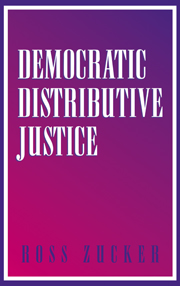Book contents
- Frontmatter
- Contents
- Acknowledgments
- 1 Democracy and Economic Justice
- Part I Unequal Property and Individualism in Liberal Theory
- Part II Egalitarian Property and Justice as Dueness
- Part III Egalitarian Property and the Ethics of Economic Community
- 8 Deriving Equality from Community
- 9 The Dimension of Community in Capital-Based Market Systems: Between Consumers and Producers
- 10 Endogenous Preferences and Economic Community
- 11 The Dimension of Community in Capital-Based Market Systems: Between Capital and Labor
- 12 The Right to an Equal Share of Part of National Income
- Part IV Democracy and Economic Justice
- Conclusions
- References
- Index
12 - The Right to an Equal Share of Part of National Income
Published online by Cambridge University Press: 02 December 2009
- Frontmatter
- Contents
- Acknowledgments
- 1 Democracy and Economic Justice
- Part I Unequal Property and Individualism in Liberal Theory
- Part II Egalitarian Property and Justice as Dueness
- Part III Egalitarian Property and the Ethics of Economic Community
- 8 Deriving Equality from Community
- 9 The Dimension of Community in Capital-Based Market Systems: Between Consumers and Producers
- 10 Endogenous Preferences and Economic Community
- 11 The Dimension of Community in Capital-Based Market Systems: Between Capital and Labor
- 12 The Right to an Equal Share of Part of National Income
- Part IV Democracy and Economic Justice
- Conclusions
- References
- Index
Summary
LIBERAL PROPERTY OR RIGHT TO AN EQUAL SHARE OF PART OF NATIONAL INCOME?
The dimension of community running through economic society has ramifications for the just way of distributing property. When incorporated into moral reasoning, it entails a rule of distribution quite different from the one found in liberal theories. Its distributive implications can be seen by substituting it in Kant's reasoning about property and distribution.
“Men” in their original condition (a state of nature), Kant reflects, are faced with the dilemma that they benefit from living together but that their unregulated interactions can also do them harm. The problem can be solved, they discover, by uniting for the purpose of living under conditions of right. The union thus formed is the condition known as civil society – not to be confused with an economic community, whose existence Kant denies. The civil union's purpose is to legislate a set of laws that constitute “public right.”
The conditions of right in Kant's theory are conditions of freedom that meet criteria of ethical freedom. By implication, the community of right is a union for the sake of living under conditions of ethically valid freedoms. It may also be characterized as a union for the joint goal of living under conditions where each person can define and pursue his or her own ends, for that is what Kant means by freedom. The moral foundation for the equal entitlement to rights stems from membership with in this sort of union.
- Type
- Chapter
- Information
- Democratic Distributive Justice , pp. 246 - 266Publisher: Cambridge University PressPrint publication year: 2000



